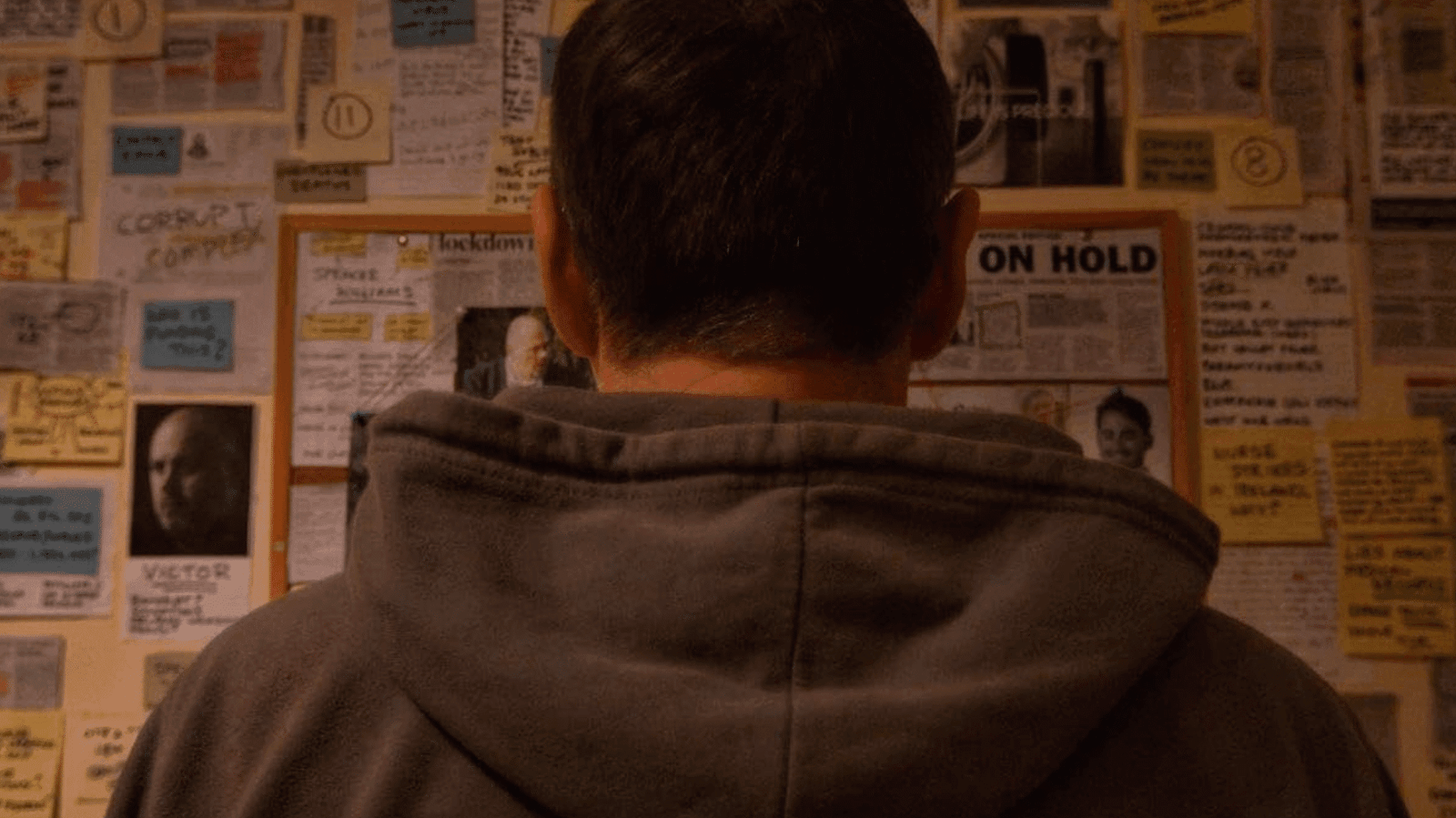
Anxieties about illness, technology and the conspiracy theories which operate in between have proven a rich source for filmmakers post-Covid. You could even suggest that this has grown into a specific subgenre. Buying Time (2024) adds to this number: it’s a super low-budget outing, with all of the attendant challenges and issues that low budget can bring, but for the most part it’s a competent drama, with flashes of solid ideas and approaches which promise more to come.
The film is set in the future, but for all intents and purposes, it’s the here and now: never say never, but the world of 2028 is fully recognisable as our own, with just a few tweaks here and there. Nihilism is the order of the day, and we start with a voiceover which explains that most people are just too preoccupied with the everyday to notice how much their lives have changed. Our narrator, Daniel (Andy Blithe) has, at least early on in the film, chosen to withdraw – to drink, and to grieve the premature deaths of his partner and daughter. News programmes on in the background fill us in on a number of new, or mutated viruses which are currently afflicting humanity; luckily, big corporations like Lifeline have been working round the clock to develop new tech which aims to prolong people’s lives, rendering them immune to a whole host of diseases. Hmm, you might think. And you’d be right.
Daniel might easily have spent the whole film quietly fulminating in his bottle-strewn lounge, but for the efforts of his friend and colleague Shaun (Ryan Enever) who tries his best to drag Dan out of the house, since he’s not currently in work and needs some sort of routine. He’s dismayed by the state Daniel has got himself in, though to be fair, they’re both look of a type, stubble and all. The stubbled men talk: Daniel reveals that, since losing his loved ones, something hasn’t quite seemed right to him. He has started to see his flashbacks and dreams not as evidence of his trauma, but as something of a puzzle, a puzzle to solve.
Meanwhile, in the bigger picture, we begin to hear more about the much-vaunted new technology which is about to dispose of many human diseases. Lifeline has engineered a microchip which combats illness; this replaces an earlier, somewhat less effective version which had already been rolled out by the NHS free of charge, but the original plan is that the new Delta chip will cost money. Safety issues be damned, there are market forces at work here and politics is starting to rear its head, too. This is clearly where Daniel’s storyline is going to meet another, with a fairly tried-and-tested tale of an individual vs. a corporation. Is the chip to blame somehow for the sudden spate of premature deaths? And if so, what can be done?
Buying Time is very much of its time, and conflates two different strands of Covid discourse: firstly, that the technology exists to combat disease (i.e. the vaccines) and secondly, that the vaccines actually carried a secret microchip, so we get business greed, anxieties about health, and the Covid death count as clear sources of inspiration. Why not imagine that the chip idea is real, it’s got a purpose, and that it may showcase the worst behaviour of the wealthy and the powerful? It’s a decent idea, even if, despite this, things do feel rather predictable in places, with guessable plot points and even character arcs. Budget is a limiting factor in many key respects, from overreliance on affordable exposition (such as via the repeated use of news bulletins to backfill the story) to variability in performances: some actors are more overblown, and others more low-key. The Lifeline team just didn’t convey menace and power effectively; happily, though, Andy Blithe (who dominates the film’s screentime) commands audience attention very well.
The filmmaking team has also worked hard to add texture and detail to the film through a range of shots, particularly in the opening act, with aerial shots, long shots, fades, flashbacks and nightmares all making an appearance. That can’t have made for an easy edit, but it shows that a lot can be made of a little, and that the ingenuity is there. The push/pull between what can be imagined and what can be realistically achieved does affect the film throughout its runtime, and so whilst Buying Time might not reinvent the genre or throw in too many surprises, it certainly acts as an interesting calling card, and works through its key ideas with a decent pace via a technically solid film. These are important things, whatever the budget. It also seems that director Kris Smith is already working on a follow-up to Buying Time (working title: Killing Time) so it’ll be interesting to see how he expands this story, now that the groundwork has been done.
Buying Time will be released on July 12th, 2024.
